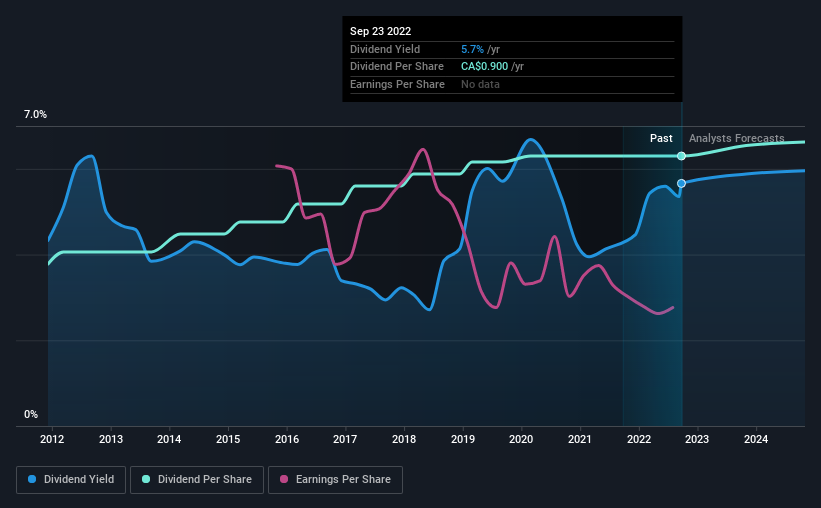Don't Buy Transcontinental Inc. (TSE:TCL.A) For Its Next Dividend Without Doing These Checks
Some investors rely on dividends for growing their wealth, and if you're one of those dividend sleuths, you might be intrigued to know that Transcontinental Inc. (TSE:TCL.A) is about to go ex-dividend in just four days. The ex-dividend date is one business day before the record date, which is the cut-off date for shareholders to be present on the company's books to be eligible for a dividend payment. The ex-dividend date is an important date to be aware of as any purchase of the stock made on or after this date might mean a late settlement that doesn't show on the record date. Therefore, if you purchase Transcontinental's shares on or after the 29th of September, you won't be eligible to receive the dividend, when it is paid on the 24th of October.
The company's upcoming dividend is CA$0.23 a share, following on from the last 12 months, when the company distributed a total of CA$0.90 per share to shareholders. Calculating the last year's worth of payments shows that Transcontinental has a trailing yield of 5.7% on the current share price of CA$15.9. Dividends are a major contributor to investment returns for long term holders, but only if the dividend continues to be paid. That's why we should always check whether the dividend payments appear sustainable, and if the company is growing.
See our latest analysis for Transcontinental
If a company pays out more in dividends than it earned, then the dividend might become unsustainable - hardly an ideal situation. Transcontinental paid out more than half (65%) of its earnings last year, which is a regular payout ratio for most companies. A useful secondary check can be to evaluate whether Transcontinental generated enough free cash flow to afford its dividend. Over the past year it paid out 112% of its free cash flow as dividends, which is uncomfortably high. We're curious about why the company paid out more cash than it generated last year, since this can be one of the early signs that a dividend may be unsustainable.
While Transcontinental's dividends were covered by the company's reported profits, cash is somewhat more important, so it's not great to see that the company didn't generate enough cash to pay its dividend. Were this to happen repeatedly, this would be a risk to Transcontinental's ability to maintain its dividend.
Click here to see the company's payout ratio, plus analyst estimates of its future dividends.
Have Earnings And Dividends Been Growing?
Companies with falling earnings are riskier for dividend shareholders. If business enters a downturn and the dividend is cut, the company could see its value fall precipitously. Transcontinental's earnings per share have fallen at approximately 6.0% a year over the previous five years. Ultimately, when earnings per share decline, the size of the pie from which dividends can be paid, shrinks.
Another key way to measure a company's dividend prospects is by measuring its historical rate of dividend growth. Transcontinental has delivered 5.2% dividend growth per year on average over the past 10 years. That's interesting, but the combination of a growing dividend despite declining earnings can typically only be achieved by paying out more of the company's profits. This can be valuable for shareholders, but it can't go on forever.
To Sum It Up
Is Transcontinental worth buying for its dividend? Transcontinental had an average payout ratio, but its free cash flow was lower and earnings per share have been declining. With the way things are shaping up from a dividend perspective, we'd be inclined to steer clear of Transcontinental.
With that being said, if you're still considering Transcontinental as an investment, you'll find it beneficial to know what risks this stock is facing. Every company has risks, and we've spotted 2 warning signs for Transcontinental you should know about.
A common investing mistake is buying the first interesting stock you see. Here you can find a full list of high-yield dividend stocks.
Have feedback on this article? Concerned about the content? Get in touch with us directly. Alternatively, email editorial-team (at) simplywallst.com.
This article by Simply Wall St is general in nature. We provide commentary based on historical data and analyst forecasts only using an unbiased methodology and our articles are not intended to be financial advice. It does not constitute a recommendation to buy or sell any stock, and does not take account of your objectives, or your financial situation. We aim to bring you long-term focused analysis driven by fundamental data. Note that our analysis may not factor in the latest price-sensitive company announcements or qualitative material. Simply Wall St has no position in any stocks mentioned.
Join A Paid User Research Session
You’ll receive a US$30 Amazon Gift card for 1 hour of your time while helping us build better investing tools for the individual investors like yourself. Sign up here

 Yahoo Finance
Yahoo Finance 
